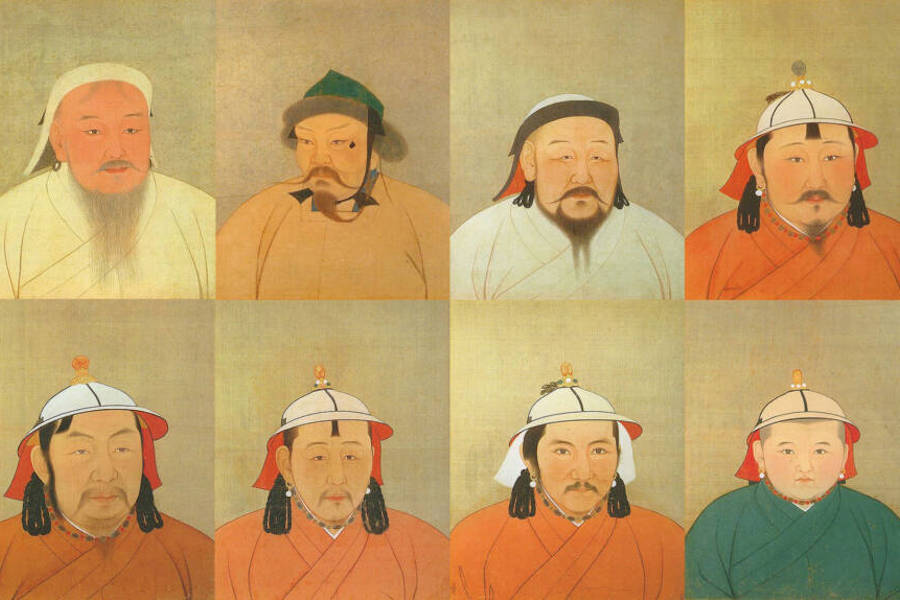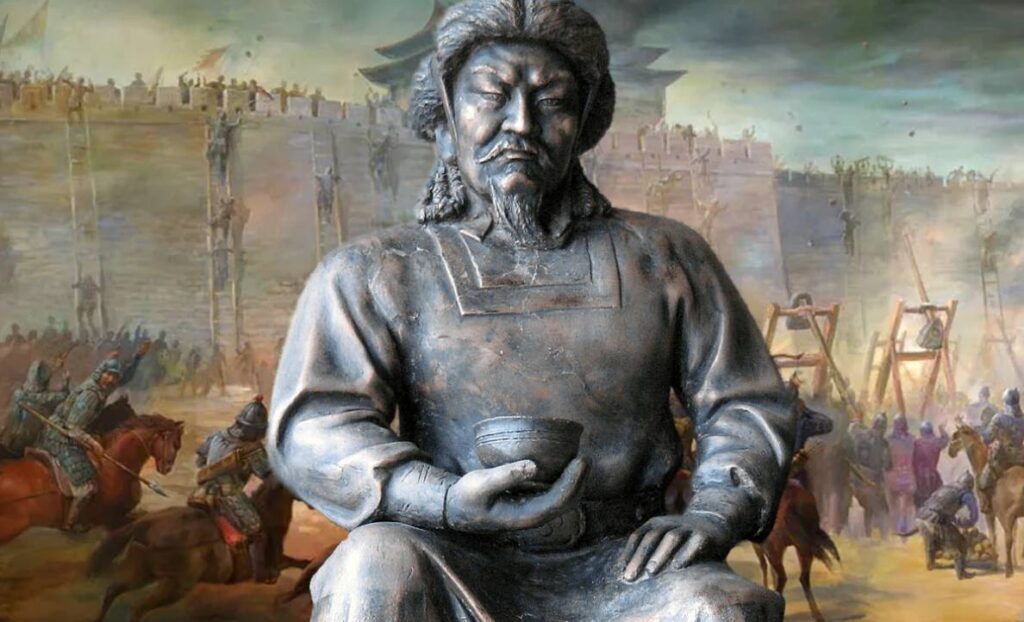Genghis Khan's Children: How Many Did He Have?
How many children did Genghis Khan, the formidable Mongol leader, actually father? The consensus among historians and geneticists alike is that Genghis Khan likely had an astonishing number of offspring, possibly numbering in the thousands, leaving a profound and lasting impact on the genetic makeup of the world.
The sheer scale of Genghis Khan's empire, stretching from the Pacific Ocean to Eastern Europe, is well-documented. What is perhaps less known, yet equally remarkable, is the potential size of his family. Historical accounts, coupled with modern genetic studies, suggest that Genghis Khan was not only a conqueror of territories but also a prolific progenitor, his legacy echoing through the generations in a way few historical figures can claim.
| Attribute | Details |
|---|---|
| Full Name | Temjin (later Genghis Khan) |
| Born | c. 1162 |
| Died | August 25, 1227 (Kansu, China) |
| Known For | Founder and Great Khan of the Mongol Empire |
| Estimated Number of Children | 1,000 - 2,000 (Estimates Vary) |
| Primary Wife | Brte |
| Key Sons | Jochi, Chagatai, gedei, Tolui |
| Legacy | Established one of the largest contiguous empires in history; significant genetic impact on Central Asia and beyond. |
| Reference | Britannica - Genghis Khan |
The sources for this extraordinary claim are multifaceted. Primary among them are historical chronicles, which, while not always providing precise numbers, consistently emphasize Genghis Khan's numerous wives and concubines. These women, often taken from conquered territories, formed the basis of his vast harem, providing ample opportunity for procreation. The logistical reality of a leader with such extensive power and resources, coupled with a societal structure that often prioritized the production of heirs, strongly suggests that the number of his children was considerable.
- Michael Kitchen Rowena Miller Everything You Need To Know
- Jennifer Love Hewitt Weight Loss Journey In 2025 Details
Secondary sources, like films and literature, frequently portray Genghis Khans life and legacy. The 1965 movie, for instance, offers a visual representation of a harem numbering hundreds of women. While such portrayals are subject to artistic license, they underscore the historical context that supports the likelihood of a large family. Accounts from the era depict the khan visiting multiple women, further solidifying the image of a man with a significant number of potential offspring. The film's depiction, while not factual, aligns with historical understanding and the sheer scale of his empire, suggesting a high probability of many children.
Adding to the historical evidence, modern scientific studies have offered compelling genetic support for the notion of Genghis Khan's prolificacy. One study, particularly noteworthy, suggests that a significant percentage of the male population in a large geographic area, spanning from Central Asia to beyond, are direct descendants of a single ancestor. While the precise identity of this ancestor is not definitively proven, the prime candidate is none other than Genghis Khan. This genetic evidence strongly corroborates the historical accounts, lending scientific weight to the narrative of a man who left a lasting mark not just on history, but also on the very genetic fabric of the world.
The Mongol leader's impact on global history is undeniable. He united disparate tribes, forged a vast empire, and oversaw a period of significant cultural exchange. His campaigns reshaped the political landscape of Asia and beyond, impacting trade routes, and the movement of peoples. His descendants, the heirs of his empire, continued to play critical roles in world events for centuries after his death. Their actions and influence stemmed directly from the foundation he laid.
The empire founded by Genghis Khan was not merely a military conquest; it was also an engine of demographic change. The movement of Mongol armies and the subsequent settlement of Mongol people in various regions resulted in significant genetic mixing. The sheer size of his empire facilitated the spread of his genes across vast territories, as the offspring of the Mongol rulers and their followers integrated with the local populations. This demographic shift contributed to the widespread distribution of his genetic legacy, making him one of the most influential fathers in human history.
The question of how Genghis Khan managed to have so many children is also a matter of historical context. The Mongol Empire was a society that prized strength, both in terms of military prowess and in the ability to produce heirs. Genghis Khan, as the leader, had access to significant resources, including a large harem of wives and concubines. His marriages were often strategic alliances, cementing his rule and providing him with the means to father a large number of children. In addition, the Mongol culture of the time valued having many offspring, which further contributed to the proliferation of his progeny.
Among the numerous children of Genghis Khan, his sons from his primary wife, Brte, were particularly important. Jochi, Chagatai, gedei, and Tolui were key figures in the Mongol Empire's governance and expansion. Tolui, born around 1191, was the youngest of Genghis Khan's primary sons and was known for his loyalty. These sons and their descendants carried on the legacy of their father, expanding the empire, administering its territories, and cementing Genghis Khan's place in history as a founder of a dynasty. The family structure of Genghis Khan, especially his relationship with Brte, and the importance of his sons in succession played a key role in maintaining the empire and his lasting impact.
The impact of Genghis Khan's lineage can still be felt today. Research suggests that millions of men living today are direct descendants of the Mongol emperor. This genetic link is particularly evident in Central Asia, where the Mongol Empire had its strongest influence. These descendants carry the genetic markers passed down through generations, linking them directly to the founder of one of the largest empires the world has ever seen. This enduring legacy demonstrates not only Genghis Khan's military and political achievements, but also his profound influence on the genetic makeup of the human population.
The marriages of Genghis Khan were often strategic moves designed to consolidate power and form alliances. His marriage to Brte, when they were both young, was arranged to secure his relationship with her family. The practice of taking wives from conquered territories was common for leaders of the time, further increasing their chances of having many children. These women, classified by rank as great empresses, empresses, and concubines, all contributed to the extensive family of Genghis Khan, demonstrating the intermingling of politics, warfare, and family in his life.
While historical records provide the basis for estimates, the exact number of children Genghis Khan fathered remains a subject of debate. Some estimates range from 500 to 2,000, while others suggest different figures. Despite the uncertainties, the consensus is that the number was substantial, reflecting the context of his power, the practices of his time, and the genetic evidence that supports the claims. The legacy of Genghis Khan continues to fascinate, as people explore the details of his life and the impact he had on the world.
The story of Genghis Khan's family life and his many children is a captivating blend of history, genetics, and cultural understanding. His story embodies the complexities of power, empire-building, and the lasting effects of historical figures on the world. From the expansion of his empire to the genetic markers carried by his descendants, the story of Genghis Khan continues to evolve, reminding us of the power of leadership and the enduring impact of history.
- White Lotus Parker Posey The Ratliff Family Drama Unpacked
- Lee Se Hee South Korean Actress Everything You Need To Know

How Many Children Did Genghis Khan Have? Inside His Prolific Procreation

Genghis Khan Family Tree

Genghis Khan's Children His Number of Sons and Daughters Malevus